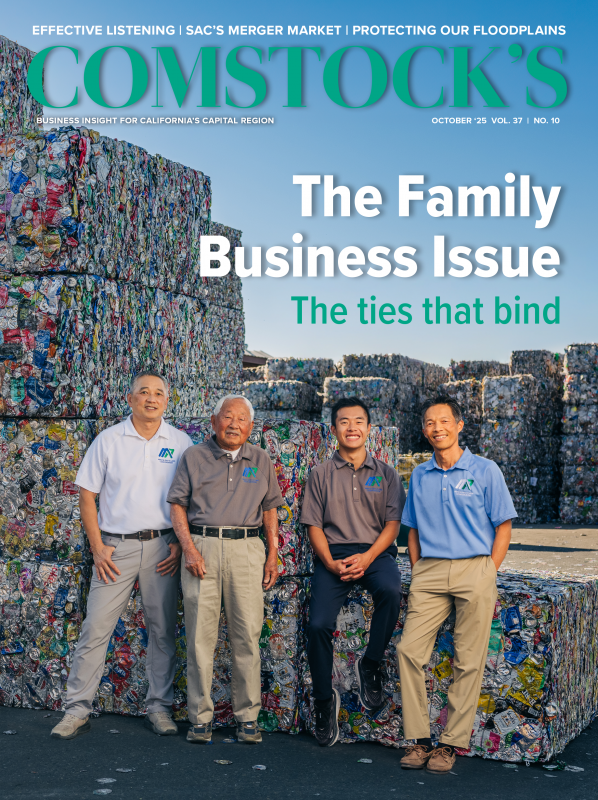Imagine you have turned your dream into reality and finally opened your own small business in California. A restaurant, hardware store, gift shop or salon — maybe a hotel.
It took years of hard work, planning, saving and securing bank loans. One day, you receive a letter from an attorney that there is a construction-related problem with your building that does not meet the standards of the federal government’s Americans with Disabilities Act. Unless you cough up several to tens of thousands of dollars to settle with the plaintiff — $14,000 is the average settlement amount — you will be sued.
You may or may not actually have an access disparity, but you are being threatened with a shakedown lawsuit designed to intimidate you into settling.
This scenario plays out several thousand times each year in California. In 2024, California was the state with the highest number of ADA cases filed, and this is a common theme for California nearly every year. In just the first six months of 2024, 1,588 ADA Title III lawsuits (access to a private business) were filed.
Related: Is Your Website Compliant? Here’s how businesses can comply with the Americans with Disabilities Act on the web, too
Currently, there is no post-settlement follow-up to ensure compliance. However, there is a simple fix: provide the business owner a reasonable period within which to correct an identified problem before a lawsuit can be initiated.
I introduced Senate Bill 84 to provide this opportunity to small businesses and improve accessibility for people with disabilities. My proposal would create a right to cure opportunity for small businesses with under 50 employees to fix construction-related deficiencies that do not meet disability access provisions prior to being sued. I am joined by 24 other Democratic and Republican legislators in both the state Assembly and Senate to implement this solution in the state of California.
Under Senate Bill 84, a construction-related accessibility lawsuit and claim for statutory damages could be filed only if (a) the defendant has been served with a demand letter specifying each nonconforming condition and (b) the disparities have not been corrected within 120 days of receiving the demand letter. This “right to cure” period honors the purpose of the ADA. People with disabilities deserve accessibility, and businesses deserve the opportunity to fix compliance issues before facing harsh legal consequences. Under Senate Bill 84, deficiencies in building construction will actually be fixed by the businesses and make more spaces accessible to all.
My legislative proposal further specifies that a defendant shall not be liable for statutory damages, the plaintiff’s attorney’s fees or costs for an alleged disparity of a construction-related accessibility standard that is fixed within 120 days following service of a demand letter alleging the nonconforming condition.
Related: So Sue Me (But Please Don’t): Our law librarian offers resources for ADA compliance
In California, the Unruh Civil Rights Act adds another layer to the federal government’s ADA to make sure that everyone in California is entitled to full and equal accommodations in all business establishments of every kind.
However, what is meant to protect all individuals and set a high standard for our state sometimes gets used by mercenary actors. Because the Unruh Civil Rights Act provides that the plaintiff is entitled to minimum damages beginning at $4,000 per disparity and may be awarded triple damages and attorney fees, mom-and-pop businesses are finding themselves fixing a $50 mirror but owing a small fortune to the plaintiff’s attorneys.
The business owner is stuck weighing the cost to settle against that of litigating a nonconforming condition, something that can quickly run up to tens of thousands of dollars. This is what forces many businesses to settle with the complainant out of court for far more than what it would cost simply to repair the disparity.
Worse, this problem has caused many small businesses to shutter, and it furthers the stigma that California is a bad place to open a business and create jobs.
In 2020-21, two plaintiffs filed more than 1,000 ADA lawsuits across California. Issues in the suits included a bathroom mirror being one-and-a-half inches too high, an accessible restroom sign being the wrong shape and the color of the accessible parking space sign not being the specified shade of blue.
Post-pandemic, California has experienced a surge in ADA lawsuits, filed by a very few serial plaintiffs. Recently, there seems to be a wave of small and minority-owned businesses targeted. These owners, often with limited knowledge of our legal system, are more likely to settle out of fear, even if the case is meritless.
The legislation would not limit the ability of individuals with disabilities to sue to protect their rights. Senate Bill 84 merely eliminates the ability of a plaintiff to recover statutory damages based on nonconforming conditions of the law that generally do not result in actual harm to the plaintiff.
Senate Bill 84 would not prevent a plaintiff from recovering general and specific damages when, for example, someone with a disability attempts to access or use a business facility and is denied, hindered or harmed due to ADA violations (e.g., an incorrectly designed accessible bathroom stall that prevents someone with an ambulatory disability from going to the bathroom).
The goal is to protect the rights of the people with disabilities to have physical access while also protecting businesses from meritless litigation. Senate Bill 84 strikes this balance by placing emphasis on increasing access to all by allowing businesses to cure their disparities.
Working on this legislative proposal has allowed me to learn from both the disability and business communities, and I am hopeful that we will all come together to provide a fair approach that will fix the disparities, ensure access for all, and keep businesses open and Californians employed.
Elected in 2022, Senator Roger Niello represents California Senate District 6, which covers portions of Placer and Sacramento counties. He first began his career as a certified public accountant and then joined his family business, the Niello Auto Group, running retail automobile dealerships. In the state Senate, Senator Niello is the vice chair of the Budget and Fiscal Review, Banking and Financial Institutions, Insurance, and Judiciary Committees.
–
Stay up to date on business in the Capital Region: Subscribe to the Comstock’s newsletter today.
Recommended For You

Is Your Website Compliant?
Here’s how businesses can comply with the Americans with Disabilities Act on the web, too
Business owners must ensure their websites are in compliance with
the American Disabilities Act, as laws around accessibility
are increasingly enforced. From video captions to sufficient
color contrast, here’s how to comply with the
latest online requirements.

An ‘Ounce of Prevention’ Is a Good Rule to Follow – Even With Recession Fears
Opinion: a workplace safety expert offers tips for preventing injuries and saving expenses
Despite the rarity of pandemics, businesses have always had to deal with some degree of uncertainty. Here are 10 tips for navigating shifts in the political, economic, environmental and technological landscape.

Dilemma of the Month: Is the Customer Really Always Right?
The customer is not always right — and is sometimes profoundly wrong. Evil HR Lady presents the moral and legal obligations employers have to their employees if a customer harasses them.

Dilemma of the Month: I Fire Bad Employees. Why Do I Have to Pay for Their Unemployment Benefits?
For an employer tired of paying for the unemployment benefits of “bad employees” they let go, Evil HR Lady prescribes getting to the root of the termination problem.




